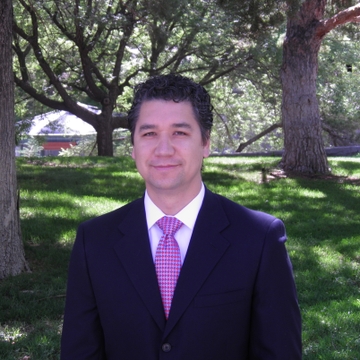Program Provides Research Opportunities for Undergraduate Students

UNM, VA get $3.1 million to study Traumatic Brain Injury electrical therapy
Clinical trials with veterans, service members to begin this winter
The U.S. Department of Defense has awarded the UNM Department of Psychiatry and Behavioral Sciences and the New Mexico VA Health Care System $3.1 million to study an innovative electrical brain stimulation technique to help veterans and service members suffering from mild Traumatic Brain Injury, or mTBI.
The UNM-VA collaboration will begin clinical trials this year to investigate whether high-definition transcranial direct current stimulation (HD-tDCS), when combined with rehabilitation training - like memory tasks - can reduce post-concussive symptoms (headaches or dizziness, for example) and improve quality of life for veterans and active duty service people with mTBI. Experts from UNM, University of Miami, New Jersey Institute of Technology, City College of New York and the Mind Research Network also will take part.
Approximately 20 percent of returning U.S. service members suffer from mild traumatic brain injury. This study will recruit 120 participants ages 18-59 from the Raymond G. Murphy VA Medical Center in Albuquerque - 80 with mTBI and chronic auditory, visual or balance symptoms; and 40 with no mTBI. Information on attention and memory, sensory performance and quality of life will be collected, while Magnetic Resonance Imaging (MRI) and magnetoencephalography (MEG) will provide a detailed picture of where and when malfunctions are occurring in the brain.
The 80 mTBI participants will then undergo either active or inactive HD-tDCS intervention, using only weak electrical currents that cause mild tingling - no anesthesia, shocks or seizures. Participants will be completely awake and comfortable, and asked to perform sensory rehabilitation tasks on a computer and through a virtual reality display. These tasks activate the brain during stimulation, allowing the electric current to have a more robust effect. Following the sessions, the same information will be gathered and compared to see what effect active versus inactive HD-tDCS had.
"We expect that not only will this stimulation be able to reduce sensory post-concussive symptoms, it also will improve attention and memory, and lead to better long-term quality of life for participants," says study Principal Investigator Davin Quinn, MD, associate professor in the UNM Department of Psychiatry and Behavioral Sciences, and attending psychiatrist at the UNM Psychiatric Center. "We also expect that after the procedure, MRI and MEG images will show that the brain is recovering from its dysfunction.
"If successful, this study will validate a new treatment for chronic post concussive-symptoms that has the potential to profoundly change the approach to mTBI," Quinn adds. "This would be of great benefit to military and civilian populations alike, given the large numbers of mTBIs that occur yearly."